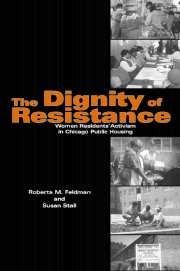Book contents
- Frontmatter
- Contents
- Foreword by Sheila Radford-Hill
- Preface and Acknowledgments
- PART I INTRODUCTION
- PART II WENTWORTH GARDENS' HISTORIC CONTEXT
- PART III EVERYDAY RESISTANCE IN THE EXPANDED PRIVATE SPHERE
- 4 The Community Household: The Foundation of Everyday Resistance
- 5 The Local Advisory Council (LAC): A Site of Women-Centered Organizing
- 6 Women-Centered Leadership: A Case Study
- 7 The Appropriation of Homeplace: Organizing for the Spatial Resources to Sustain Everyday Life
- PART IV TRANSGRESSIVE RESISTANCE IN THE PUBLIC SPHERE
- PART V CONCLUSIONS
- Epilogue
- Appendix A Timeline of Wentworth Gardens Resident Activists' Key Initiatives
- Appendix B A Demographic Profile of the Resident Community Activists Interviewed, 1992–1998
- References
- Index
6 - Women-Centered Leadership: A Case Study
Published online by Cambridge University Press: 06 July 2010
- Frontmatter
- Contents
- Foreword by Sheila Radford-Hill
- Preface and Acknowledgments
- PART I INTRODUCTION
- PART II WENTWORTH GARDENS' HISTORIC CONTEXT
- PART III EVERYDAY RESISTANCE IN THE EXPANDED PRIVATE SPHERE
- 4 The Community Household: The Foundation of Everyday Resistance
- 5 The Local Advisory Council (LAC): A Site of Women-Centered Organizing
- 6 Women-Centered Leadership: A Case Study
- 7 The Appropriation of Homeplace: Organizing for the Spatial Resources to Sustain Everyday Life
- PART IV TRANSGRESSIVE RESISTANCE IN THE PUBLIC SPHERE
- PART V CONCLUSIONS
- Epilogue
- Appendix A Timeline of Wentworth Gardens Resident Activists' Key Initiatives
- Appendix B A Demographic Profile of the Resident Community Activists Interviewed, 1992–1998
- References
- Index
Summary
I would like to reflect on, to say to you, and to the young people who are here, when you start hearing in school and reading about our African-American heroines who have been our civic leaders politically, and our organizers, and our Fannie Lou Hamers and our Harriet Tubmans, I want you to remember Mrs. Amey; Mrs. Hallie Amey, who worked in Wentworth Gardens to make sure there were grocery stores and laundromats, because there were a need to have them. There was a need to make sure there were recreational facilities available for young people who were living in Wentworth Gardens. And there was a need to make sure that everyone was aware of changes too, that were happening in public housing. Today, Mrs. Amey, this is your day…. Tonight is our way of saying thank you to a heroine … our way of giving you your roses while you can smell them.
Sandra Harris, CHA Staff, Tribute Dinner for Hallie Amey, November 8, 1996Feminist researchers have observed that women, especially African-American women, exercise leadership at the grassroots in ways that are differ from conventional notions of leadership (Barnett, 1993, 1995; Payne, 1989, 1990; Robnett, 1996, 1997; Sacks, 1988a). They argue, as does, Bernice McNair Barnett (1993), that conventional conceptions of leadership need to be reconsidered:
I contend that we need to rethink the traditional notion of leadership, for organizing is one important leadership role…. The organizing activities of [the civil rights leader Ella] Baker and other Black women, especially working-class women at the grass-roots level, should be considered as valid leadership roles
(p.176)- Type
- Chapter
- Information
- The Dignity of ResistanceWomen Residents' Activism in Chicago Public Housing, pp. 151 - 178Publisher: Cambridge University PressPrint publication year: 2004



